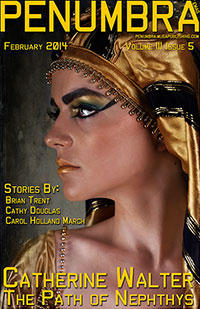Reviewed by Charles Payseur
A thirsty traveler is more than he appears in “The Anubis Gift” by Cathy Douglas, a mythological fantasy in which Khephra, a young Egyptian woman, gets a little bit more than she wished for. Told as a sort of morality fable, Khephra faces not only the aspect of helping a man in need but also the temptation of being rewarded by a god. Khephra’s situation is relatable, her reactions human, and her reward a mix of punishment and justice. The moral of the story, though, seemed to me just a bit too simple to be completely satisfying. While I found Anubis’ judgment interesting, the story left me a bit wanting for something more.
Carol Holland March weaves a tale of magic realism in “The Call of the Benu,” in which two lovers, El and Addie, find their way into a new world. Set in a post-apocalyptically-flavored near future, Addie cares for El, who is ill, while she has dreams about the coming of a great bird that will usher them into the next life. El’s vibrancy and bright personality are contrasted both by the dullness of her illness and by Addie’s more restrained nature. The situation seems hopeless, and there is the feeling that Addie is getting ready for the end, though El seems to know that it will not come as he suspects. Weaving together ideas of reincarnation and rebirth, the story culminates with the bird revealing itself to both of them, and Addie and El walking forward into their unsure future. There is a sense of hope, though, and vitality, that the sickness that afflicted not just El but the whole world can be wiped away. And that hope is what I found lifting, what helped make the story fly for me.
“The Path of Nephthys,” a historical fantasy by Catherine M. Walter, showcases Nephthys, sister to Queen Isis, as she deals with her inappropriate love for her brother-in-law and the consequences of her magical indiscretions. Though an obedient and dutiful sister and wife, Nephthys finds herself drawn to Osiris, her sister’s husband, and when magic gives her a way to fulfill her desires she takes it, becoming pregnant with Osiris’ child. Hiding the true nature of her pregnancy from both her abusive husband, Typhon, as well as Isis and Osiris, Nephthys hopes to raise the child as legitimate, but a close resemblance to the true father thwarts her, and she is forced to give up her child in hopes it can live safe from Typhon’s rage. Steeped in magic and the politics of royal court, the story flows nicely enough, but I found the morality of the story, as well as the conclusion, a little vague. There were simply too many aspects of the story that didn’t seem clear to appreciate it fully.
A man sneaks into the land of the gods and steals a set of magic scrolls in Brian Trent’s fantasy story “The Scholar and the Books of Thoth.” Djet, having been skillfully killed and revived by his slave Keket, comes back from the dead with tomes of ancient magic and skills, and promptly begins using his new magic to clear a path for himself to power and prestige. Even as he masters the spells of the scrolls, though, justice (and more than one surprise snake) stalks him for his affront to the gods. And in the end not even his new magic can protect him from his own arrogance and greed. While it might be a bit predictable at times, the story nonetheless delivers an interesting take on the Egyptian afterlife and a rather fun tale of divine justice.
Charles Payseur lives with his partner and their growing herd of cats in the icy reaches of Wisconsin, where companionship, books, and craft beer gets him through the long winters. His fiction has appeared in Perihelion Science Fiction and is forthcoming from Wily Writers and Dragon’s Roost Press.
 Penumbra #29, February 2014
Penumbra #29, February 2014